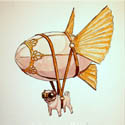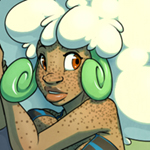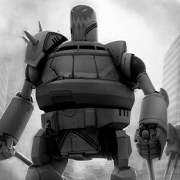|
 Here is everything I knew, as of three days ago, about The Beginner's Guide:
Then my friend Matt (with whom I am currently also doing an LP of The Talos Principle) said: "Hey, you know what would be cool? The Beginner's Guide was pretty neat, but I didn't like how much the narrator explained everything and told me what to think. "Since you haven't played it yet, I want to watch you play through it for the first time, but with the narrator turned off. I want to see what someone makes of the game without all the explanation. "Sound fun?" Well: in real life, I'm an English teacher. Interpreting texts is sort of my thing, and because I am a huge dork I spend a lot of time thinking about how traditional techniques of analysis can be applied to, e.g., the sort of texts that are popping up online -- the sort of "texts," in other words, that could never have existed before the internet started to develop its own rhetoric. I particularly like thinking (and talking) about the various ways games can tell stories purely through their mechanics. In other words: yes, this sounded ridiculously fun. So, this past Sunday, we hooked up our setup and Matt watched me play through the entire game with the sound turned off. He was there to convey essential information (like the basic premise, or when to occasionally press Enter in response to the narrator's direct instruction), but mostly shut up and let me try to pick apart what argument the game makes purely through its aesthetics and gameplay. I think the results are pretty interesting:     This initial playthrough is broken into four parts, and I'll be posting one every day from now through Friday. During this time, I welcome any feedback and discussion. Update: one week later, we sat back down to play the game through again with the sound and narration on. This turned out to be every bit as fascinating as the initial run:    
Occultatio fucked around with this message at 02:49 on Oct 24, 2015 |
|
|
|

|
| # ? May 15, 2024 13:51 |
|
Thanks for playing along. I'd like to think that, someday, high school English students might be asked to write papers on Games and not just books. After we replay this with the narrator on, you'll have to let me know what grade you give yourself for this analysis!So far I'm thinking at least B, B+ territory  . .
|
|
|
|
I played The Beginner's Guide late on Sunday night, and it's been buzzing through my head every hour since. Really interested to see where this experiment goes!
|
|
|
|
This is really interesting to me, loved the game and I'm intrigued to see what your interpretations will be.
|
|
|
|
Oh, I forgot! After recording the video, I did 5 minutes of googling and found the "guy watches Memento in chronological order" thing I was talking about. Turns out to have been the work of David Morgan-Mar, the guy behind stuff like Darths and Droids and Irregular Webcomic, which by the way is somehow still going, holy poo poo. Part 2 will be up soon! To whet your excitement, here's what the link banner is going to look like: 
|
|
|
|
Okay, fine, enough anticipation: here's your next video! poo poo starts to get real, and armchair psychiatric diagnoses are made.
|
|
|
|
I'm really excited by this analysis you have going on. The individual games all have a surreal dream-like quality to them, and that kind of "obviously fake" stuff always draws me in.
|
|
|
|
I saw this game on steam a few days ago. Then I saw that you started this LP, so I bought and played the game. To be honest, I can't recommend it.
|
|
|
|
This is neat. You guys do good elpees.
|
|
|
|
Glad some people are enthusiastic -- thanks for the feedback! Hopefully there'll be more to really talk about after the last video goes up tomorrow. For now, though, have some theatrical and mechanical shenanigans: 
|
|
|
|
I am super interested in seeing how your analysis goes through to the end of this, so I can properly discuss like, what went on in that last section. That you're specifically doing two runs through this game is probably the best part, even above and beyond playing it first without commentary.
|
|
|
|
This is really interesting, I just don't feel like it is right to comment until you have finished the game though!
|
|
|
|
This is pretty interesting to watch without the narrator. I'm looking forward to when you then go a step further and get someone to analyse your playthrough, is anyone else a bit worried about the way he keeps turning round and thinking walls and giant all consuming eyeballs are creeping up on him? Clearly indicative of a paranoid nature, mmhmm Thanks for the link to the Talos Principle LP as well, missed that one, will be catching up on it I think
|
|
|
|
Watching through Part 2 right now - in the game with all the "online messages", one of them is 'do you feel like a hero yet?', which is also a line from Spec Ops: The Line. Which came out in 2012.
|
|
|
|
Gertrude Perkins posted:Watching through Part 2 right now - in the game with all the "online messages", one of them is 'do you feel like a hero yet?', which is also a line from Spec Ops: The Line. Which came out in 2012. I REMEMBER NOTICING THIS! I totally forgot to actually point it out audibly on the video, but yeah! Of course, that kinda fucks with the chronology in a big way -- it can only be interpreted as Davey Wreden, in his role as designer of The Beginner's Guide, winking at the audience, which happens nowhere else in the gameplay. Anyway! Here's the final video. I'm working on a BIG post about my thoughts and conclusions 5 days post-facto, but it's taking me long enough to write that I don't want to delay posting this until it's done. 
|
|
|
|
All right. Having had a week to think about the game, though, during which I rewatched all the videos, I have some more "final" thoughts (at least for this playthrough): Most importantly, Coda has to be a woman. I've turned this over in my head a lot, and it's the only satisfying explanation I can find for the woman in the prison cell and the gendered forms of address in the "interrogate the machine" game. I don't know where my assumption that Coda is male came from -- whether Matt unconsciously used a gendered pronoun or whether I just have a phallonormative worldview -- but there is absolutely nothing in any of the games to support that reading. If Coda is female, then the glimpse of the woman in the cell we get at the end of the "break the machine by lying" game reads as her recognizing that, although an abstract wall of words may have been destroyed by comforting lies, she herself is still as imprisoned as ever (corresponding to my in-video interpretation of the prison sequence as doing an end-run around actual emotional resolution; the idea that she escaped is, itself, another comforting lie, and she knows it). So why does Coda make games? I think I hit on it in the second video, at the end of the surrealistic descent that began with the house in the white void: her games are designed purely to communicate emotions. Almost every single one of her games has absolutely no explicit purpose or direction; the two exceptions are the Whisper Machine, which is unfinished, and the blind spaceship, which I'll try to get to later. Early on, she suggests purpose by (for example) directing your gaze when the game loads at the location you need to reach to end it, but the next time that trope recurs (This Game is Connected to the Internet), you're looking at the one place and direction you cannot go. This design philosophy is hinted at obliquely in Coda's final messages to Davey: she opposes the idea that games should have "solutions." This is an interesting word, particularly taken in context of her accusation that the lampposts have been added in by Davey. "Solution" implies the existence of a puzzle; a puzzle is that which requires not merely interaction but mental engagement by the player. Puzzles are mysteries; puzzles require thought. Coda does not want her players interacting with her games on either of those levels, which leaves only the possibility of passivity as the desired mode of engagement. The problem Coda faces -- and yes, Coda is clearly facing problems, rather than those being, as she claims, purely Davey's projections (the clarity with which this came through is perhaps the one shining triumph of this whole weird experiment we're doing) -- is irresoluble for two main reasons: fear and denial. Specifically, what Coda fears is the future; more specifically, she fears the permanence of choice. Think back to the very early game with the brick walls, where you could only move backwards. This game had one of the most explicit messages in the entire sequence: constant attention to the past hobbles you from being able to face the future (specifically, to "confront" it -- note the assumption that the future is an enemy). The problem, of course, is that the player is not allowed to choose otherwise: we may know that walking backwards isn't wise, but what other option truly exists? This could simply be seen as an early nervousness; what solidifies the interpretation that Coda is scared of choice, decision and forward progress is The Puzzle -- you know, the one puzzle with the door. As I observed in a later video, the central metaphor of The Puzzle is one-way motion: advancing forwards requires permanently locking off everything behind you. In fact, the first time we see The Puzzle (as I noted in the video, but didn't make the connection), it comes immediately after going over a ledge -- what I specifically called out as an instantly-recognizable-to-gamers Point of No Return. But the biggest clue is what lies between the doors: darkness and obscuring mist. It's kind of creepy! Until you accept the outcome of permanently locking away access to what is known and familiar -- that is, until you SOLVE THE PUZZLE (and Coda comes to hate the idea of solutions, remember) -- all you can do is hang out in the darkness. Coda tries to make the best of this: think of how many references there are to learning to "kind of like it" in there. Hell, in two later games, The Puzzle is actually the agent of the player's death! Coda's big problem, though -- or at least her problem that stops her from dealing with her other problem -- is denial. She doesn't want her games to have solutions (a gun in a game with nothing to shoot). She doesn't want her games to have a defined goal or endpoint (Davey violating her "one boundary" by adding lampposts). She doesn't, in the end, want anything to do with Davey. But she is making games. All those things she doesn't want -- solutions, goals, endpoints, interaction with other people -- those are fundamental to the medium, because what CENTRALLY defines the medium of game is that the works are interactive. If people don't PLAY them, if people don't move THROUGH them, then no art has been created. She wants to blame Davey for putting in his lampposts, but that's pure denial: that complaint acts as though the existence of the lamppost is what makes the location it is placed the "goal." But it's NOT. The game would end there one way or another, because games end. If a game is a work of art, then its duration is its frame. Coda tried to escape this inevitability early on: remember the staircase? We could, arguably, read that as an attempt to avoid solution-based gaming by frustrating the player into choosing to quit, but that was a terrible plan in every aspect, because there WAS still a goal, and you COULD reach it if you were patient enough. (And continuing on with the staircase game, what do you SEE at the top? A bedroom filled with half-baked game ideas. It's almost as though what you found... was Coda herself. "Solving" games, in her head, brings the player into her head, leaves her vulnerable, violates her boundary.) But games have endings, and Coda simply cannot face that. So: denial and avoidance. She doesn't have a problem; as the omniscient "director" of her life, she knows everything that needs to happen. It's just... the actual "her" that lives her life keeps screwing everything up. People are strange and confusing and they make her nervous and they have weird "rules" that nobody tells her about and they say nonsensical crap and they push her away. People like her games, but that way of reaching out becomes all they see her as; they want to interact with the generative machine inside her, and then they want to "solve" her through what she produces, and she retreats and destroys her connections and denies the existence of any problem. ...woof, that got kind of depressing by the end. I dunno, there is almost certainly stuff I'm missing or that I forgot to talk about. Please feel free to jump in and discuss! My one request, again, is please do not share any information/conclusions derived from the narration. Go ahead and quibble for now with whether my interpretation of the gameplay is a valid interpretation of the gameplay, but if I'm obviously wrong about some conclusion given something that Davey says out loud at one point then please hold off on mentioning that until after (at least) Sunday. Thanks, and let's have some fun!
|
|
|
|
Ok, so my main question: Is the final maze in the epilogue, where you're floating away, the skybox from the whisper machine level? A lot of these levels have you assuming the player is Coda, or an aspect of coda, but rather, how many are them exploring someone ELSE's role? Games usually are that. Like we don't play the Stanely parable assuming the player was a representation of the game's creators. We don't play halo thinking that Master Chief is an aspect of the writer. Or that Sora and his trials represent the writer or creator of Kingdom Hearts. Davey interacted with Coda. How many levels is the player supposed to be Davey (or an extension of Davey) in? I'd propose that the theatre level, and the one where you're a woman interrogating the machine, in those levels, the player is Davey. And in the theatre level, I think the confident skilled ideal woman is Coda. Not even as Coda saying "I'm perfect". The professor level is all about emulating perfection, Coda knows you can appear perfect and not be perfect, but as "Davey is enthralled with Coda from the moment he saw Coda." Like, these games are not so Davey can play them and try to glean some insight, but so Coda can explore Davey's headspace. Express their frustration with Davey, maybe even how they wished Davey acted. When replaying the game, what levels were changed by Davey and where? when did the door puzzle NOT have an answer? Because Coda clearly isn't bound by the single form of the door puzzle, a few variations of it show up. When does "The level continues" not seem in character for Coda who resents the lampposts, and doesn't think meaning or finality is some inherently good thing? Also Coda is SUPER frustrated. They're explicit that they're frustrated with Davey and have been. But like, as an artist, they're right about downtimes. It happens and you deal with them, my longest artless period was like, at least two years long, after I graduated from college. External pushes against downtime can get crazy stressful too. People editing your work is frustrating, People actively ruining the point of your work is infuriating. How many times did Davey do that explicitly and tell the player? The stairs, the prison? When did davey stop telling the player? Davey isn't showing you Coda's games, he's showing you his copy of Coda's games, from 4 or more years ago, changed and compiled to work for The Beginner's Guide. And likely changed from when he showed people the games before Davey and Coda parted ways. And when you play with Davey's commentary, think about how many times is he ending the level on you, and how many times does he let it breathe? How many times is his ending the level representative of the game Coda crafted. Like when he flashes through the prison levels, how many of those completely lose any point they had by seeing them in rapid succession? How many lose the point by being shown at all, or alongside other variations? Is the game idea room at all representative of what coda made? Davey's version has you walk up the stairs almost entirely normally, and spend like, a minute in a room of WAY MORE than you can read in a minute, before being yanked away regardless of your will so he can show you the next thing. That's not an experience Coda made at all. But it's still given to represent Coda, as Davey talks about it the whole time. And when making art you can select an audience. You can have private pieces you share with people you trust, and them sharing that betrays that trust. Not every piece of art is "Throw it on the web, lose all control over it, and see what happens" or "Sell it". I have drawings only one person has seen, that I made for them. I've made physical drawings that I never scanned, and mailed to a friend or still have, or threw away and never shared. I have sketches I never finished and never reached a point of sharing. Coda doesn't release these games, at least not willingly, so they're obviously not using them for a job. Coda, presumably, does something else with their free time, aside from games. Game making is just a hobby. Also, made this before your big explination post and woah can I not accept one line at all. Occultatio posted:Coda's big problem, though -- or at least her problem that stops her from dealing with her other problem -- is denial. She doesn't want her games to have solutions (a gun in a game with nothing to shoot). She doesn't want her games to have a defined goal or endpoint (Davey violating her "one boundary" by adding lampposts). She doesn't, in the end, want anything to do with Davey. I disagree with the idea that everything is meant to be shared or played. I disagree that video games, which are seperate from like, some board game or literal games, should be bound by concepts that define games. The name, which has stuck, is just an unfortunate artifact of its origin. Video games are a young medium with a lot of unexplored opportunities. Endings, goals, solutions, are no more inherent to the medium than like, pictures, guns, or failure states. Minecraft, at least originally, did not have a goal. it was a box of tools, and later, an open ended experience that the player largely helped to define. A crafted experience, designed to last as long as the player wishes it to, is no more something with an ending than a picture, or a radio station.
|
|
|
|
One thing I will say, re: discussion of Coda's gender: Davey's commentary always uses he/him/his pronouns when referring to Coda. So if the "ma'am" and the woman in the cell are indeed Coda, then is there a transgender narrative at play?
|
|
|
|
I may have plenty of words to say, but they will have to wait until Sunday, and also not be said by others before me. I also had a whole block of words typed up after the previous lines, but decided in the end that the subjects I was bringing up would be covered in narration anyways, so!!! I'll wait for Sunday! DoubleFakeEdit: And in typing, untyping, and previewing, FicusArt hit some of the points I had been making or was planning to make, but probably much better than I was going to make them.
|
|
|
|
FicusArt posted:Davey isn't showing you Coda's games, he's showing you his copy of Coda's games, from 4 or more years ago, changed and compiled to work for The Beginner's Guide. And likely changed from when he showed people the games before Davey and Coda parted ways. This is major food for thought. That's a whole level of interpretation that had completely not occurred to me, but it instantly makes sense. I don't have a full response right now; I'm going to need to chew on it for a little while. FicusArt posted:I disagree with the idea that everything is meant to be shared or played. I disagree that video games, which are seperate from like, some board game or literal games, should be bound by concepts that define games. The name, which has stuck, is just an unfortunate artifact of its origin. Video games are a young medium with a lot of unexplored opportunities. Endings, goals, solutions, are no more inherent to the medium than like, pictures, guns, or failure states. Minecraft, at least originally, did not have a goal. it was a box of tools, and later, an open ended experience that the player largely helped to define. A crafted experience, designed to last as long as the player wishes it to, is no more something with an ending than a picture, or a radio station. Hmmmmm... I see where you're coming from on this, but I'm not sure I agree. Goals and solutions, absolutely those are not inherent, but endings I think are. A game can't just hang on the wall and exist even when nobody is looking at it; it must be turned on and, ultimately, off again. I don't think this is an artifact of etymology (although it does keep making me think of Keith Burgun's theory of the Four Interactive Forms, which is admittedly tangential to this conversation but really fascinating). BUT I'm really thinking about the idea of a game ending when the player wishes it to, as opposed to the designer; I'm reminded of Proteus, whose central experience looped infinitely back around itself until the player got bored/was satisfied. After all, Davey's the one who put the lampposts in; who's to say the player could not have chosen to turn around and walk back the other way through the level? Well... Coda is. Because many, many of Coda's games are one-way. Inherent in the level design is an intended, directional flow. In fact, I think the ONLY game that allows the player true freedom of movement is the "online" cave.
|
|
|
|
Occultatio posted:Hmmmmm... I see where you're coming from on this, but I'm not sure I agree. Goals and solutions, absolutely those are not inherent, but endings I think are. A game can't just hang on the wall and exist even when nobody is looking at it; it must be turned on and, ultimately, off again. I don't think this is an artifact of etymology (although it does keep making me think of Keith Burgun's theory of the Four Interactive Forms, which is admittedly tangential to this conversation but really fascinating). I agree that games don't need a planned ending. Elements of games often force that requirement (stories end, songs end, you run out of lives etc.) but gameplay can and has been developed where the only ending is a player decided one.
|
|
|
|
I agree with FicusArt mostly, but I wanted to chime in with my own thoughts on the lamp posts. To me, it's less about Coda hating endings.. in that eventually they have endings anyway, the doors are a pretty clear point of ending, they just don't need to be, well.. lamp posted. They're the end, Coda just doesn't feel the need to blow a trumpet to indicate to the player that it is. The issue is more that like the 3 dots which seem to be Coda's mark, the lamp posts are more Davey putting his stamp on a game before re-releasing it to the public, like in a possessive way he's claiming it as part of his own, which would be pretty rude. Unlike the 3 dots, which seem to come at random points in the game as a little motif, you can't miss the lamp posts, they're always right in front of you, going against the theme of whatever they're in. Rather than just reaching an end and being able to think about it a bit, it's more. TADAA, the End! Have an achievement. It's a bit annoying that the skips Davey offered do seem to ruin the very basic process of the game, that the journey makes it important. I actually really liked when you went up the stairs without the speed up, despite having seen it all before, it felt like it was more valuable somehow Did it ever say in the game what the very first point was when Davey started interacting with Coda? I don't recall it ever being spelled out with a 'this is the first one', only vague bits informing you when he wasn't there for this game. But yeah, I came to the conclusion that Davey and Coda was the same person at the end, and I agree that it just felt disappointing. I'm actually hoping I might get convinced otherwise really, it would actually add a purpose to it.
|
|
|
|
The way I see it, they aren't techincally the same person, but both are fake. The narator isn't actually Davey himself, but one of two persons the real Davey created for this game. I don't know what the real Davey is like, but the narrator seems to be a little to artificial. I am literally sure that there isn't actually a real Coda. Mostly considering a meta reason. If most of the information you get are to be taken at face value, collecting these "games" and selling the compilation under his name on steam would be the biggest dick move Davey could do. Especially if you consider that Coda doesn't want them to be seen or modified by anyone. Or Coda exists and still has contact to Davey, so he allowed him to freely modify everything, to sell it. In that case the text in the tower level would be a bunch of lies to make the story more interesting, purposely misrepresenting the mental state of a person he calls a friend. Both of these seem unlikely. So, if Coda isn't real, where do these "games" come from? Either Davey made all of them within a few months and purposely built them in a way that would make the creator seem emotionally challenged. That option seems incredibly dishonest and feels manipulative. Or the dates on these games are true and they are Daveys creations from that time. In that case this whole game would be a self absorbed mess in which an artist tries to express his emotional state through several layers of abstraction, acting like it should be inaccesable while undermining it. Or he took just some of his old stuff, modified it so it feels more depressed and called it a game. That would be a way to create a game with the least effort neccesary. Every single of these five options throws a really bad light on Davey and I can't think of a scenario which wouldn't make me dislike that guy. The game mostly annoyed me and I wouldn't recommend it to anyone. Your LP is actually way better than playing the game itself. cant cook creole bream fucked around with this message at 15:46 on Oct 17, 2015 |
|
|
|
Air is lava! posted:Either Davey made all of them within a few months and purposely built them in a way that would make the creator seem emotionally challenged. That option seems incredibly dishonest and feels manipulative. What's wrong with this option? It only means that he fabricated a story, that he created everything wholesale to tell this tale. Is that really such a bad thing? I'll admit that the game does open with the idea that everything is real, but it doesn't really bother me to learn that it's fiction. Also, it seems like the most obviously true scenario, and doesn't really take away from the messages of the game.
|
|
|
|
Vateke posted:What's wrong with this option? It only means that he fabricated a story, that he created everything wholesale to tell this tale. Is that really such a bad thing? I'll admit that the game does open with the idea that everything is real, but it doesn't really bother me to learn that it's fiction. I don't really know. It just feels really dishonest. Like he created the levels first and decided how they present the character of Coda afterwards. Ideally you want to create your chracter before you decide what that character would create. But here it feels like he skipped that part, made the levels and retroactively decided what Coda is like based on that. All of these little games don't convey the feeling that they are something personal which means a lot to somebody. Instead they feel like they do their best to pretend they do that and trying to do that in an effective rather than a natural way. I am neither an artist, nor a psychologist and usually not a critic, so I can't really describe why I don't like that. But it reminds me of stories which progress based on surveys, polls and data mining rather than a clear intend. Usually when I look at some art I ask my self what the artist tries to express. Here my question tends to be, what the artist tries to pretend to express. And usually that is okay, unless the object in question takes itself to seriously. I can enjoy a lighthearted action movie, even though I know that countless people wrote on it based on what works best in that moment. But If you try the same approach in an artsy film which tries to evoke emotions I usually hate it. Maybe the game isn't subtile enough, maybe Coda isn't written well enough to be the "real creator" who actually tries to express stuff, or maybe I am just a stupid person with bad opinions, maybe it's just the fact that the game doesn't feature a single thing I actually enjoy. I don't know what it is, but it drives me to dislike the game. cant cook creole bream fucked around with this message at 16:36 on Oct 17, 2015 |
|
|
|
Vateke posted:What's wrong with this option? It only means that he fabricated a story, that he created everything wholesale to tell this tale. Is that really such a bad thing? I'll admit that the game does open with the idea that everything is real, but it doesn't really bother me to learn that it's fiction. I'm 100% in agreement here -- it feels very strange to accuse an author of being "dishonest" for inventing a character with emotional struggles, even ones so extreme as alienation and depression (particularly given that this tradition dates back literally to Homer). It would be dishonest if Coda were a real person that developer!Davey is deliberately misrepresenting, but Air is lava!'s analysis of why Coda is almost certainly fictional is almost certainly correct. I can't, obviously, comment yet on what meaningful differences exist between developer!Davey and narrator!Davey, and I can certainly imagine coming out the other side with an intense dislike for the latter, but thus far I have nothing but respect for d!D as an artist. Edit: Air is lava! posted:All of these little games don't convey the feeling that they are something personal which means a lot to somebody. I disagree strenuously on this point -- after the very beginning, the levels felt much more like they were trying to communicate emotions -- an internal, personal message -- than merely to make a generalized argument whose specific creator did not matter. Occultatio fucked around with this message at 16:40 on Oct 17, 2015 |
|
|
|
EponymousMrYar posted:I agree that games don't need a planned ending. Elements of games often force that requirement (stories end, songs end, you run out of lives etc.) but gameplay can and has been developed where the only ending is a player decided one. This really resonates with me, especially considering how often Occulatio compares his experience in this game to Myst. When you beat Myst (in any of the three methods), there's no true ending, no credits screen, etc. You just keep playing. You have free reign of the island, you can visit any worlds you wish, or you can remain trapped in a book for all eternity. The game doesn't end and the credits don't roll until you make the conscious decision to quit the game. Coda's games seem to be intended to just continue on without resolution in much the same way. It is the Narrator who decides when your experience should end and the next one should begin. Not knowing any of the narration, I take Coda's games to be messages to the Narrator; they are her replies or refutations to his (admittedly unheard) arguments that video games need objectives, endings, goals, etc. Maybe the bug in the second level was a eureka experience for Coda, and Coda's frustration is that the Narrator cannot break out from the mindset that games need goals, and in entertaining his point of view, it has stifled her creativity. She cannot "liberate" him from his limited thinking, and he is instead shackling her with requirements over her art. I'll risk saying that he doesn't consider walking simulators to be "games," and she doesn't feel that her creations have to be "games" at all. Edit: I suddenly had a bunch of thoughts. Spookyelectric fucked around with this message at 19:59 on Oct 17, 2015 |
|
|
|
Two notes that no one has raised yet. First the game includes the un-compiled versions of the map files. I don't have the Stanley Parable installed to check if it does as well but considering the games plot it may be intentionally meta. Secondly the note "Devil Tower Star". You noticed in the video that it is repeated quite close together in front of the dot painting. In Tarot these are the 15,16, and 17th cards which is also the code 151617 .
|
|
|
|
Thank you for this interesting look at the game. I was afraid going into watching this that too much of the subtext is actually in the text of the narration and I am glad to see that it really was not. Playing without all the narration actually brought up things that you would miss like the starting camera position and the Colour theorising which is something I did not notice during my play through except with "The tower". Despite what you said (you mentioned monitor problems) - The colour of the Tower outside of the Enterence/Exit rooms is not actually the same warm orange from the rest of the game. It is actually a muted red. The tower is actually unique in a way - no where else is that dark grey architecture the views of the angled upwards lit stairs in the skybox remind me of cold dark under city of the movie metropolis. RichardA posted:Two notes that no one has raised yet. First the game includes the un-compiled versions of the map files. I don't have the Stanley Parable installed to check if it does as well but considering the games plot it may be intentionally meta. With Coda's statement at the end of Narrator!Davey putting in solutions when there is none - I wouldn't be surprised if this was intentional. The whole thing strikes me as a statement that authorial intent does not matter in the interpretation of the audience consuming it.I think this let's play is even more testament to this philosophy. I just saw reinstalling the game the icon is an eye with a cross over it - a statement on not seeing maybe. (It could also be an inverted representation of the Lamppost but the lamppost also represents Narrator!Davey misinterpretation Coda's games.) This is a good place to put the Idea channel video on Death of the author I think. here.
|
|
|
|
Shaded Spriter posted:I just saw reinstalling the game the icon is an eye with a cross over it - a statement on not seeing maybe. (It could also be an inverted representation of the Lamppost but the lamppost also represents Narrator!Davey misinterpretation Coda's games.) That's actually the symbol for a Coda in musical notation, though it is interesting that it doesn't appear anywhere in the game as far as I know. It'd make for a good "signature" to hide in the games... if the three dots aren't that, anyways.
|
|
|
|
One thing that I noticed about your interpretation is that every time the dialog options show up, you assume one of them is correct and the others are wrong. When I first saw this game, what those dialog boxes reminded me of is a trick Knights of the Old Republic 2 used. In the middle of conversations, NPCs would sometimes bring up events you the player would not have heard of before, and among your available reactions are exposition. Like, someone would say "Oh, this is like the time [Person X] was banned." And your options would look like 1: "Oh, you mean when he went to [Y place] and did [Z thing]?" 2: "Yeah, this is exactly like that." 3: "No, this time [A thing] is happening." You're not actually supposed to pick #1; it's there so that dialog can deliver exposition to you without any of the characters stopping to go "AS YOU KNOW, bluh bluh bluh". The dialog options here immediately remind me of that, where the options are all technically options but some or all of them are talking to you rather than the other characters, especially since what you pick never actually means anything and several of the selections flow into each other like a single thought. e: I looked up what the Devil, the Tower, and the Star imply when doing tarot divination, and it seems relevant. Devil- Upright: Bondage, addiction, sexuality, materialism - Reversed: Detachment, breaking free, power reclaimed Tower- Upright: Disaster, upheaval, sudden change, revelation - Reversed: Avoidance of disaster, fear of change Star- Upright: Hope, spirituality, renewal, inspiration, serenity - Reversed: Lack of faith, despair, discouragement Heatwizard fucked around with this message at 01:39 on Oct 19, 2015 |
|
|
|
|
One thing I thought of after watching the last video and hearing your commentary of it, is that there is the possibility of Davey biasing our feelings with the games we are presented. For all we know (and I think this will still be true after hearing Davey's dialog) is that these presented games are the only data points we have, the only games Coda made. Coda might have made even more games and never let them out, or even if she/he did and Davey got them, who says that Davey did not include them because they did not match the message he wanted to present. You have to remember, that last sequence at the end points to the idea that Davey is an unreliable narrator. That brings in the question on why did Davey leave it in? Edit: Is there going to be a play-through with the audio? I'm quite intrested in finding out if there are any answers in Davey's dialog.
|
|
|
|
I've only watched these LP videos so I haven't heard the narration either, but I'm getting the impression that the original version of The Whisper Machine was "finished" from Coda's perspective. The "glitch" was actually an important and intentional part of the game that got changed because of some conversation with Davey where he dismissed it as a mistake.
|
|
|
|
All right everybody, gear up: it's time for Round 2! This past Sunday, as promised, we got back together and played through the game again, start to finish, with all the sound on. It was fascinating. It made me really, really glad I got to experience the game this way; looking at just the levels first without commentary opened my eyes to a whole lot of thoughts that I would probably not have had if Davey's narration had been there coloring my initial exposure. As before, I'll try to get these up roughly one per night this week, but there may be some delays due to technical difficulties that require more extensive editing work on my end. For instance, you will note that my audio has some clipping in it: I don't know why that happened, but it made it an absolute bitch to re-sync with the other two audio tracks. Anyway, here's the first video of the second run: 
|
|
|
|
Ah yes, excellent. Ready set fish is like, only really there for the creator. It's maybe more than ANY other level, not a product to be consumed, it's a product to be made. There are a few of these. Coda makes games, tosses them away, sometimes to the recycle bin, and forgets about them. So like, ready set fish is less a game to be played, and more an experience of making lots and lots of game. Just playing around with making interweaving corridors. Ready Set Fish wasn't the game, the program Coda used to create it was. Ready Set fish was just sort of like, a byproduct. I have a general idea on like, the point Davey is making with this whole game, and what it's made to be about, but maybe that's better saved for the end of week 2's run
|
|
|
|
One thing I will say is, it appears Davey is definitely showing some hypocrisy with his treatment of Whisper. "I'll show you these games for what they are, not what they're not." And then he edits the ending before you know otherwise, and tries to make you skip the labyrinth before you can solve it because it's too tedious. It's the true vision of the creator, minus the boring parts. I'm also kinda glad you're calling Davey out on some of the more "reaching" parts of his analysis. I'll save most of my comments for the end of the run, so as not to possibly preempt any conclusions you might come to in the videos, but needless to say I am fascinated.
|
|
|
|
I've got a counter-argument to the lamp-post discussion at the very end, it's simple but it hinges on something from I think the very next level, so I'll hold off for now. I don't remember any other sticking points from this to discuss about, but there is something you seemed to miss from Chapter 1: Whisper both times through: right before the door to the labyrinth, in that tiny offshoot is the three dots. I find it interesting that that signature, if that's what it is, is there even before Coda gets bit by the Art bug from the ascension glitch and stops working on that game. What does it mean to Coda, that it's there even before his games take a turn away from Davey's definition of playable? Now what if I told you the three dots are in even more places? Like, as was found in the Games thread for The Beginner's Guide, The Stanley Parable? It's been there since at least May of last year, so it's not like it was thrown in for the sake of tying in to The Beginner's Guide right before it released.
|
|
|
|
Here's a thought. What if most of the early games weren't meant to be seen by anyone else and were created by Coda for Coda and he/she was the only person meant to play them. Take the stairs one for example. The room at the top is a visual representation of various game ideas. Perhaps that's why it's there. It's a place coda can go to to sorta visualize some of his/her ideas. sorta like how some people write their ideas on paper. For all we know the other games were created as a way to test out certain ideas or better learn the engine that was being used. Hence why they would usually end up in the recycle bin and forgotten. I mean you certainly wouldn't release something that was just you fooling around with a game engine to get a handle on it. I can't say I know how Davey had acquired the earlier games, perhaps he managed to talk Coda into showing them to him since Davey did say in the first game that he was interested in Coda's style. Another thought is that the Entering and Exiting games aren't actually two different games like Davey says but in fact one game that were segmented so Davey can drive some kind of point to the player. from what we can tell the narrator clearly isn't above editing someone elses work to make a point. Lastly I think the cafe/prison is our first actual iteration of the prison that we see much later in the game. It even has the bars that you are supposed to be stuck behind and this is probably the first game that we start to see the narrators influence start to take hold since there is a definitive end to it. Oblivion4568238 posted:I've got a counter-argument to the lamp-post discussion at the very end, it's simple but it hinges on something from I think the very next level, so I'll hold off for now. Is it possible that the 3 dots are actually Davey's Signature since it initially shows up in his game? Doseku fucked around with this message at 06:29 on Oct 21, 2015 |
|
|
|
I want to touch on Matt's last comment about Coda possibly lying. The Great and Lovely Descent might be the first of a series of responses to Davey's need for solutions and endings from Coda. First Davey shares that anecdote before the Puzzle, where Coda made hundreds of one-room experiences in response to Davey suggesting Code make "Playable Games". Then we revisit the Puzzle. The first committee presses us for a solution which we refuse to give. Conversely, the second committee refuses to hear the solution and instead emphasizes their preference of enjoying the space between the doors. This is a metaphor for Davey and Coda's dialogue about what exactly constitutes a video game. The lamppost is instead a message to Davey. All of the games where Coda "fixates" on it are continuations of this argument. Instead of the dishonest narrator, we have the clueless narrator as demonstrated by his so-called bugfix. Nobody is a liar. By the end Coda is maybe just fed up with never getting through to Davey? Which upcoming levels contain the lamppost? Of the prison levels, I think it only makes an appearance in the last one next to the phone booth.
|
|
|
|

|
| # ? May 15, 2024 13:51 |
|
I don't have anything to add at this moment but I just wanted to say that I appreciate the hell out of this LP, and I'm glad that I was able to experience The Beginner's Guide for the first time in the same way as you because of it. I was strongly emotionally affected by my own interpretation of the story, and I'm positive I wouldn't have gotten the same experience any other way. So thanks. 
|
|
|























